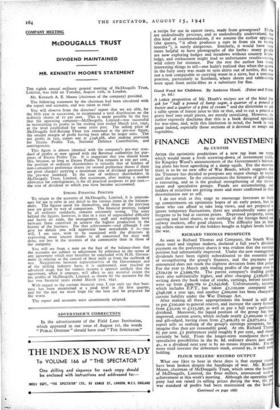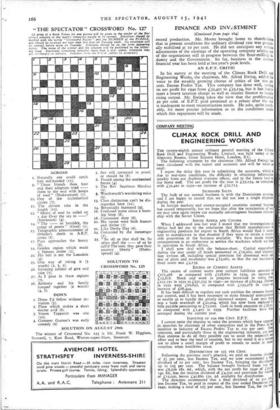FINANCE AND INVESTMENT
By CUSTOS
AFTER the optimistic predictions of a new tap loan on terms which would mean a fresh screwing-down of investment yields, Sir Kingsley Wood's announcement of the Government's borrow- ing plans has been something of a damp squib. For the moment there is to be no new offer of War Bonds, which suggests that the Treasury has decided to postpone any major change in tactics until the autumn. In the circumstances the firmness of gilt-edged is reassuring, and so is the gradual strengthening of the invest- ment and speculative groups. Funds are accumulating, and holders of securities are getting more and more confirmed in then determination not to sell.
I do not wish at this stage to encourage investors to build up commitments on optimistic hopes of an early peace, but for those who can afford to take long views, and are prepared to ignore temporary fluctuations, there are undoubtedly some good bargains to be had at current prices. Depressed property, stores, catering and hotel shares, to say nothing of the foreign bond and railway markets, offer good chances. The difficulty lies in find- ing sellers since most of the holders bought at higher levels before the war.
RICHARD THOMAS PROSPECTS
As soon as Richard Thomas and Company, the South Wall sheet steel and tinplate makers, declared a full year's dividend payment on the preference shares it was evident that the earnings position had substantially improved. Under the new management dividends have been rightly subordinated to the essential task of strengthening the group's finances, and the payment now announced does not mark the slightest deviation from this policy. For the year to March 29th trading profits of the group rose by £829,129 to £3,999,762. The parent company's trading profits were also substantially higher, and after charging £236,081 fa writing down the book value of stocks, earnings, before taxation, were up from £999,769 to £1,642,608. Unfortunately, taxation, which includes E.P.T., has taken £1,120,000 compared with £648,196 a year ago, and another L200,00o has been charged to current liability under the War Damage Act.
After making all these appropriations the board is still able to put kroo,000 to general reserve, and increase the carry forward from £32,too to £153,297, as well as pay a full year's preferena dividend. Moreover, the liquid position of the group has been improved, current assets, which include nearly £r,000,000 in C3' and gilt-edged, having risen from £7,409,583 to £9,975,014. Tie report tells us nothing of the group's earnings prospects, but I imagine that they are reasonably good. At 16s. Richard Thom 61 per cent. LI preferences yield roughly 8 per cent., and should certainly be held. From the longer-term standpoint there rt speculative possibilities in the 6s. gd. ordinary shares just undd 4s., as a dividend next year is by no means impossible. For the more staid investor the debenture stock, around 91, is well Ivor holding.
FLOUR MILLERS' RECORD OUTPUT
What one likes to hear in these days is that output recd have been broken despite the handicaps of war. Mr. Kenne Moore, chairman of McDougalls Trust, which owns the busin of McDougalls, Limited, the flour millers, announced such achievement at this week's meeting. Although the operating c pany had not raised its selling prices during the war, the P war standard of profits had been maintained on the basis Continued on page 166)
FINANCE AND INVESTMENT
(Continued from page 564) record production. Mr. Moore brought home to shareholder' that in present conditions the ordinary dividend rate was practio, ally stabilised at so per cent. He did not anticipate any serious adjustments of the earnings of the operating company arising out of the negotiations still in progress between the flour-milling in. dustry and the Government. So far, business in the current financial year has been held at last year's peak levels.
AN E.P.T. CRITIC
In his survey at the meeting of the Climax Rock Drill and Engineering Works, the chairman, Mr. Alfred Ewing, added Ns voice to the steadily growing chorus of critics of the sac) pet cent. Excess Profits Tax. This company has done well, raising its net profit for 1940 from £32,421 to £55,134, but it has had to meet a heavy taxation charge as well as muster finance to handle rising output. Mr. Ewing takes the view that the problematical 20 per cent. of E.P.T. paid promised as a- rebate after the war is inadequate to meet reconstruction needs. He asks, quite justit ably, for more precise information as to the conditions under which this repayment will be made.



























 Previous page
Previous page